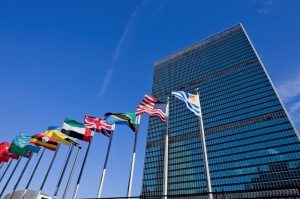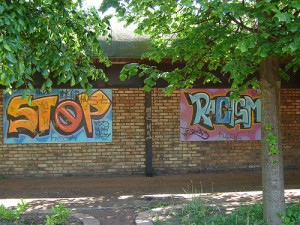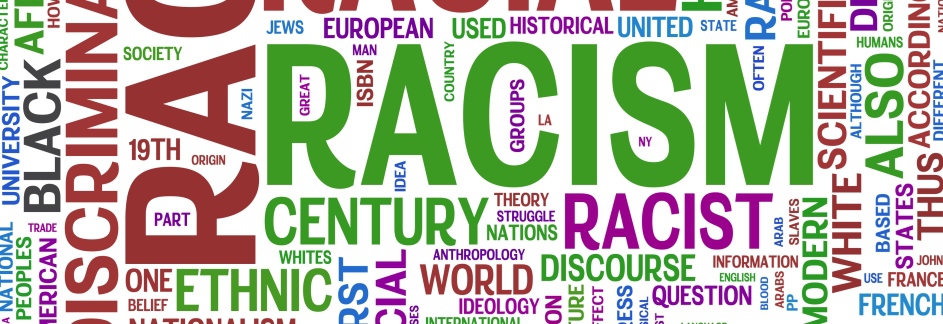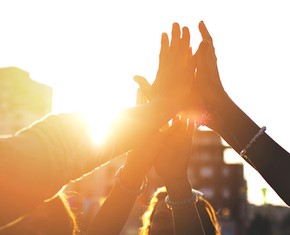The views expressed in our content reflect individual perspectives and do not represent the authoritative views of the Baha'i Faith.
Just as a fever is a symptom of disease in the body, racism is a symptom of disease in society. Suppressing the symptom does not cure the disease, but curing the disease eliminates the symptom. The Baha’i International Community is convinced that the disease from which society currently suffers is failure to recognize the principle of the oneness of humanity, and racism is but a symptom. If we wish to eliminate racism entirely, we must establish, as the moral of foundation for society, the unshakable conviction of the oneness of the human race.
This is a bold assertion, but one we believe is upheld by the conclusions of the Global Consultation on Racism and Racial Discrimination held in October 1988, pursuant to General Assembly resolution 42/47. This historic consultation was held to further the goals of the Second Decade to Combat Racism and Racial Discrimination. The conclusion of the Conference participants was that the international community is “confronted today with a new challenge of racism and racial discrimination which (has) infiltrated many parts of human society and questioned its spiritual and moral foundation.” In questioning the spiritual and moral foundation of society, racism could have a strangely positive effect. To continue the disease analogy, the more unpleasant the symptom, the more powerful our motivation to combat the disease.
From the Baha’i perspective, racism is one of the most baneful and persistent evils in society. Racial discrimination is baneful because it violates the dignity of human beings. And yet it persists. Racism is poisonous because it cripples its victims, corrupts its perpetrators, and blights human progress. And yet it persists. Why? We believe that racism persists precisely because it is deeply rooted in outdated attitudes and erroneous beliefs.
Accordingly, any campaign to eradicate racism must change those attitudes and beliefs. Although necessary, political action alone cannot offer a permanent solution. In the Baha’i view, racism will be eliminated only when the peoples of the world are convinced of the oneness of humankind and proceed to reconstruct their lives and their societies on that basis.
The recognition of the oneness of mankind would require the abandonment of all doctrines of superiority, many of which still persist implicitly despite our preoccupation with its more obvious forms such as apartheid. More importantly, by establishing the foundation for true co-operation, the recognition of this principle would raise civilization to a new level. At this higher level, no one need fear oppression, even those who were formerly oppressors. The sharing of power and responsibility among all citizens can then be implemented without fear, through appropriate legal measures and equitable social and economic policies.

UN Building in New York City
The Baha’i International Community commends the United Nations for facilitating and co-ordinating an international educational campaign against racism. With the proclamation of the Second Decade, the United Nations has taken the first step towards the implementation of such a campaign, and we applaud the various international activities that it has already undertaken in this connection. Moreover, we welcome the General Assembly’s renewed invitation to UNESCO, in General Assembly resolution 42/47, to expedite the preparation of teaching materials on racism and racial discrimination, with particular emphasis on activities at the primary and secondary school levels.
We submit, however, that a more sustained and far-reaching educational campaign is called for. First, although the United Nations can facilitate such an effort, we are convinced that such a campaign must be undertaken at the grassroots level. The aim must be to create a more universal awareness of racial equality and the need for racial unity. Secondly, we are convinced that the presentation of factual information about the problems of racism will be insufficient to change attitudes. Hearts must be touched by an awareness of the bonds that unite people of all races. We, therefore, suggest that UNESCO be asked to develop a model universal curriculum on the more fundamental principle of the unity of humankind.
We also wish to urge the participants in the international struggle against racism to avoid politicizing these activities. Experience has taught us that when an issue becomes politically contentious, paralysis ensues. This applies both to standard-setting and implementing activities. No nation can claim to be entirely free of racist tendencies; therefore, we can approach this problem as a shared human problem. International human rights co-operation can thus be greatly ameliorated if member states adopt a more constructive approach.
A further means of improving international co-operation and co-ordination in this field is to ensure the continued and strengthened involvement of non-governmental organizations. NGOs usually take a relatively impartial and independent approach to human rights issues. In most cases, they are not bound by vested state interests and can thus aid the deliberations by refraining from involvement in ideological strife and politicization. Moreover, NGOs have, in many cases, developed solid expertise that can prove valuable to international human rights work. Finally, because some NGOs represent large memberships, often from a wide range of countries and cultures, they are indispensable assets to the international human rights machinery.
 The Baha’i International Community, for example, has over a century of experience in building communities committed to the principle of the oneness of mankind. Since the mid-19th century, myriad religious, racial, ethnic, cultural, linguistic and national elements have come together to promote the concept of unity in diversity. Our programme for the realization of racial unity is at once social, spiritual and organic. Recognizing that commitment to a spiritual principle has social implications, the Baha’i system of community organization employs practical measures to encourage the participation of minorities. The principle of racial equality is taught, and individuals are encouraged to identify and overcome old patterns of behaviour.
The Baha’i International Community, for example, has over a century of experience in building communities committed to the principle of the oneness of mankind. Since the mid-19th century, myriad religious, racial, ethnic, cultural, linguistic and national elements have come together to promote the concept of unity in diversity. Our programme for the realization of racial unity is at once social, spiritual and organic. Recognizing that commitment to a spiritual principle has social implications, the Baha’i system of community organization employs practical measures to encourage the participation of minorities. The principle of racial equality is taught, and individuals are encouraged to identify and overcome old patterns of behaviour.
Thus, concerted effort on the part of ordinary people has brought about a unique form of racial integration in Baha’i communities in every part of the world. If our experience can in any way contribute to the struggle against racism and racial discrimination, we are happy to offer it for study.
You May Also Like
Comments

















humankind” and the elimination of racism and racial discrimination, A couple
of thoughts come to mind: 1) BIC’s statement does not deal with the bogus
notion of superiority / inferiority of races; 2) Nor does it appear to
“investigate the essentials of divine religion, seek the realities
underlying the oneness of the world of humanity and discover the source of
fellowship and agreement, which will unite mankind in the heavenly bond of
love.” (`Abdu’l-Baha: Promulgation of Universal Peace*, Page: 144)
Let the white make a supreme effort in ...their resolve to contribute their
share to the solution of this problem, to abandon once for all their usually
inherent and at times subconscious sense of superiority, to correct their
tendency towards revealing a patronizing attitude towards the members of the
other race, to persuade them through their intimate, spontaneous and
informal association with them of the genuineness of their friendship and
the sincerity of their intentions, and to master their impatience of any
lack of responsiveness on the part of a people who have received, for so
long a period, such grievous and slow-healing wounds. Let the Negroes,
through a corresponding effort on their part, show by every means in their
power the warmth of their response, their readiness to forget the past, and
their ability to wipe out every trace of suspicion that may still linger in
their hearts and minds. Let neither think that the solution of so vast a
problem is a matter that exclusively concerns the other. Let neither think
that such a problem can either easily or immediately be resolved. Let
neither think that they can wait confidently for the solution of this
problem until the Further to my earlier submission, I’d like to offer the
following comments for consideration:
I suspect there is much more to “erasing” racism from humanity’s
Weltanschauung than can be “combatted” as fighting against or for something
is commonly believed. ‘Abdu’l-Baha leads humanity to “seek the realities
underlying the oneness” of humankind and to develop the source of fellowship
and agreement– these will “unite” humanity in “heavenly bonds of love.” We
can ask ourselves what are the “realities” underlying the oneness of
humankind? What must we do to investigate the “realities” that underly human
oneness as is pointed to by ‘Abdu’l-Baha? How can we go about discovering
the “source of fellowship and agreement that will unite humanity?
In his letter known as “The Advent of Divine Justice” Shoghi Effendi
provides, what I call, a template I have used to explore issues related to
racism, sexism, ablism, disparity between rich and poor and other human
entities that are appositional to each other. He writes: “Let neither think
that anything short of genuine love, extreme patience, true humility,
consummate tact, sound initiative, mature wisdom, and deliberate,
persistent, and prayerful effort, can succeed in blotting out the stain
which this patent evil has left on the fair name of their common country.
Let them rather believe, and be firmly convinced, that on their mutual
understanding, their amity, and sustained cooperation, must depend, more
than on any other force or organization operating outside the circle of
their Faith, the deflection of that dangerous course so greatly feared by
‘Abdu’l-Bahá, and the materialization of the hopes He cherished for their
joint contribution to the fulfillment of that country’s glorious destiny.”
Perhaps interested Baha’is could explore Shoghi Effendi’s analysis and
action he suggests. I suspect in doing so we will learn and internalize the
realities underlying human oneness and cultivate a positive way to talk
about it and engage others.